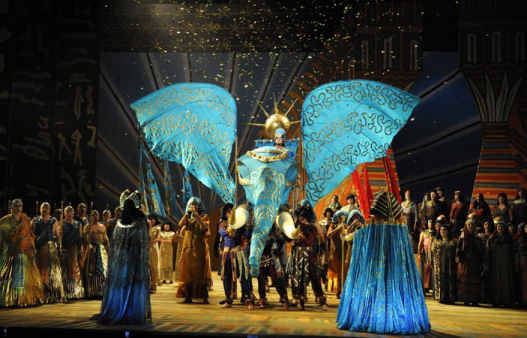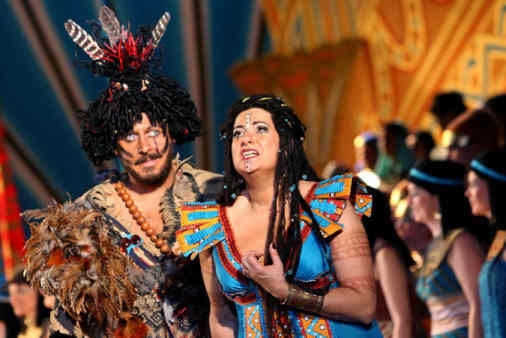Other Links
Editorial Board
- Editor - Bill Kenny
Founder - Len Mullenger
Google Site Search
SEEN
AND HEARD OPERA REVIEW
Verdi, Aida:
Soloists,
Chorus and Orchestra of the English National Opera. Conductor:
Gérard Korsten. London Coliseum, London. 25.10.2008 (JPr)

In an
interesting essay in the programme for the revival of the 2007
production by Jo Davies of Aida, Lucy-Hughes Hallet’s
interesting essay ‘Fearful Dreams of Egypt’ touched on this subject
as she described this opera as‘the most spectacular and successful
of all nineteenth-century Europe Egyptian fantasies …’. There is
little room for counterargument in a review but hindsight is a
wonderful thing and indeed the colonial pasts of many nations
clearly do have things to apologise for but Aida is not one
of them though Madama Butterfly, might well be another
matter! Verdi’s main driving force herei was the love story allied
to the fact that he was both anti-clerical and a patriot. ‘Kitchen
sink’ realism became a dramatic device only in the mid-twentieth
century and all Verdi had available as outlet for his personal
beliefs in his time, were his grand melodramas and sweeping stories.
The colours may seem gaudy, the costumes cumbersome and the cut-out
sets rather pantomime-ish but it still
gives ENO - in
their straitened circumstances - a
sell-out evening of the pure ‘thud
and blunder’ Verdi opera which is a
pleasure to indulge in from time to time. Added
to this is the joy gained
from seeing an opera company
(once seemingly on death
row) get a reprieve by raising its artistic standards
so marvellously. The orchestra now
seems on a par with Covent Garden's and
the coaching of both principals and chorus is improving with every
opera staged. Much credit then, must
be given to artistic director John Berry and to
music director Edward Gardner for ENO’s revival.
So if we pare down Aida to the kernel of an authoritarian
state where the priests have the last word to crush the will of
individuals to love whoever they choose; then all we have is Don
Carlos transferred to Egypt. With Aida, Verdi gives us
a much more focussed and coherent work which is musically superior
and without showy cabalettas. Jo Davies’s production for English
National Opera is something that seems ideal for our ‘credit crunch’
times and is also very suitable for concentrating the mind on what
appeared to matter most to Verdi in Aida. Against the
backdrop of Zandra Rhodes’s designs, described in the publicity as –
quite rightly – ‘extravagantly opulent’ I find that everything works
very well and I, for one, really appreciated the gold ticker-tape
entry of the turquoise elephant at the end of the ‘Triumphal March’.
I reported on this production last year and much of what I wrote
then about the sets and costumes still stands (see
review). Moreover with the elements of pyramid shapes in
the designs, particularly in the more intimate Acts III and IV, I
also noticed a certain pre-planned geometry in the direction this
time. It may not be that the singers just run to either end of the
front of stage to sing, but having
been together are symbolically finishing
off their own triangular shapes.
Clearly this production has divided critics and in fact Oslo
- the other opera house in the original
co-production with Houston - have pulled
out from the agreement because their artistic director considers the
staging not up to his ‘professional standards’. Oh dear!

Most of the principals from the 2007 performances returned and most
were clearly more at ease with their roles than before and
(only my imagination maybe)
a little slimmer - unlike the
chorus in their gold skirts who seemed rather more mixed
in sizes now when bare-chested. John
Hudson was an ardent Radam
Vocal honours went to Claire Rutter’s Aida who was even
lighter-skinned than last year. Totally secure, her phasing was
impeccable and appealing; the highlight
was her very tenderly lyrical and touching Act III ‘Oh, skies of
blue’. Together with John Hudson they sang a heart-wrenching
farewell to life at the end of opera. Best of all was Iain
Patterson’s Amonasro in full native-Ethiopian costume who was
outstanding throughout and particularly in the savage fury of his
Act II ‘Destroy us, you armies of Egypt!’
As an ensemble, the principals
and chorus sang up a storm at the end of Act II and much of the
evening’s success has to be due to Gérard Korsten conducting at the
ENO for the first time. He never once over-looked
the intimate moments but there was grandeur to his reading of
Verdi’s imaginatively rich palette of
colours that would not have been out of place in Verona.
My one concern is that ENO's current
success is drawing in a type of audience who will in times to come
be re-educated about opera. The person sitting next to me asked me
at the interval ‘Do they sing all the opera here in English? I
didn’t realise that.’ And behind me I overheard after the interval
‘Do you want to know what happens next?’ the reply being ‘No don’t
tell me, just let me find out.’ It confirms what the poet Thomas
Gray wrote; ‘Ignorance is
bliss’!
Jim Pritchard
Pictures © Alastair Muir and Tristram
Kenton
Back
to Top
Cumulative Index Page
